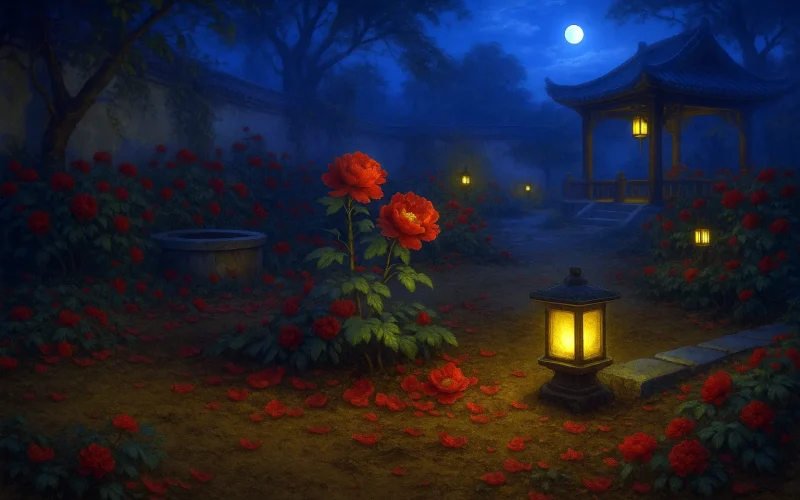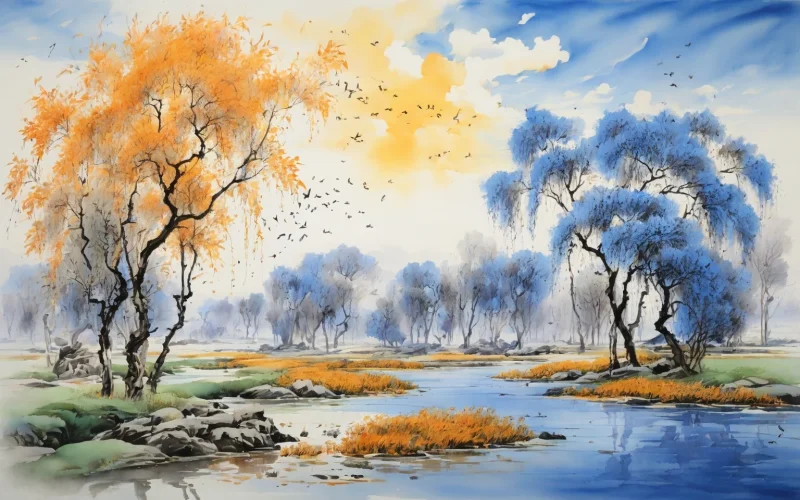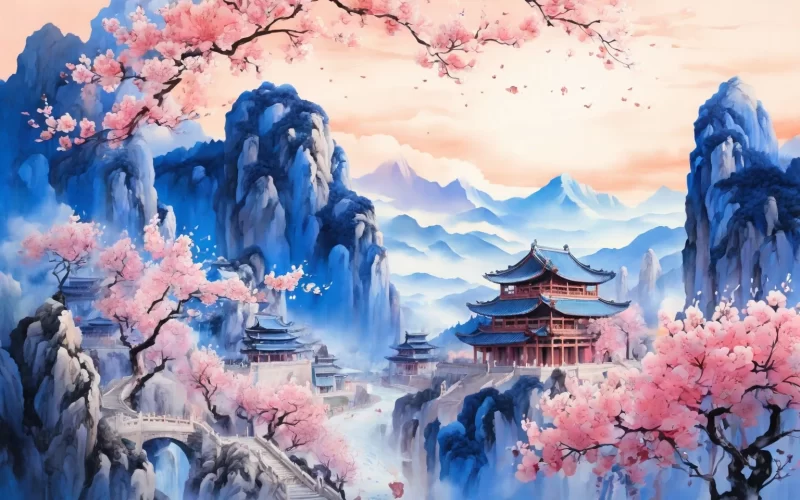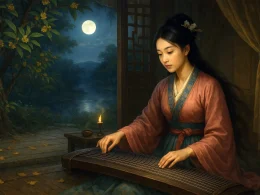I'm saddened by the courtyard peonies brilliant red,
At dusk only two of them are left on their bed.
I am afraid they can't survive the morning blast,
By lantern light I take a look at the long, long last.
Original Poem:
「惜牡丹花 · 其一」
白居易
惆怅阶前红牡丹,晚来唯有两枝残。
明朝风起应吹尽,夜惜衰红把火看。
Interpretation:
Bai Juyi is known for his delicate emotions and accessible language. His poetry not only depicts reality but also conveys his reflections on life. This poem, Regret for the Peony Flowers, is one of his later works, written during his retirement. At this point, the poet had already experienced the ups and downs of his career and had deep feelings about the impermanence of life. The peony, long a symbol of wealth and prosperity, is fading before the poet's eyes, triggering his sorrow. On the surface, the poem speaks of the sadness of flowers wilting, but it also embodies the poet's thoughts on the fleeting nature of life and the transience of beauty.
First Couplet: "惆怅阶前红牡丹,晚来唯有两枝残。"
I stand before the steps, filled with melancholy, gazing at the blooming red peonies. However, by evening, only two branches withered remain.
The poet immediately establishes a tone of sorrow with the word "惆怅" (melancholy), setting the emotional foundation for the entire poem. He observes the peonies in the courtyard in detail, capturing the two withered flowers amidst the full bloom, and expresses his sorrow with precision. The choice of words like "唯有" (only) and "两枝" (two branches) directs attention to the fading flowers, emphasizing the poet's sensitivity to the passing of beauty.
Second Couplet: "明朝风起应吹尽,夜惜衰红把火看。"
If the wind rises tomorrow, these remaining peonies will likely be blown away. Thinking of this, I light a torch at night, gazing at the fading flowers with deep affection.
The poet anticipates the wind that will bring the flowers' final demise, leading to the action of "夜惜衰红" (nightly lament for the fading flowers). Lighting a torch to gaze at the flowers at night not only highlights the poet's deep affection for the peonies but also symbolizes a reluctant but persistent cherishing of beauty. The torchlight reflects off the fading flowers, enhancing their final glow and deepening the poet's sorrow. The act of "lamenting the flowers" ultimately conveys the poet's reflection on life's brevity and the impermanence of all things.
Overall Appreciation:
Although short, the poem develops in layers, with the emotions building gradually. Starting with the sight of withered flowers, the poet moves from melancholy during the day to cherishing the flowers at night, and finally to a vision of the future. The emotions ascend steadily, reaching a climax with the act of "lighting a fire to gaze at the flowers." This is not merely an expression of sorrow for the flowers, but also a depiction of the inevitability of losing beautiful things. The peonies, illuminated by the night and the firelight, are more vibrant, yet more fleeting, just like many beautiful things in life—glorious but transient.
Writing Characteristics:
- Progressive Structure and Rich Emotions: The poem moves from daytime melancholy to nighttime cherishing, and from sorrow to anticipation of the future, deepening the emotional layers.
- Specific Details to Enhance the Emotional Impact: Details such as "two withered branches," "wind rising tomorrow," and "lighting a torch to gaze at the fading flowers" make the sorrow for the flowers feel real and tangible.
- Use of Symbolism: The peony is not just a flower but a symbol of beauty and prosperity. Through his lament for the peony, the poet reflects on the fleeting nature of life, time, and the unpredictability of the world.
Insights:
This poem is not only about lamenting the flowers but also about the poet's deep reflections on the impermanence of life and the unpredictability of worldly affairs. Life is like the flower—beautiful yet fleeting. We cannot stop the passage of time, but we can cherish the present moment and grasp what is before us. The poet, lighting a torch to gaze at the flowers, shows wisdom in cherishing the fleeting beauty. Even knowing that beauty will eventually fade, we can still appreciate and love it wholeheartedly in the limited time we have.
Poem translator:
Xu Yuan-chong (许渊冲)
About the poet:

Bai Juyi (白居易), 772-846 AD, was originally from Taiyuan, then moved to Weinan in Shaanxi. Bai Juyi was the most prolific poet of the Tang Dynasty, with poems in the categories of satirical oracles, idleness, sentimentality, and miscellaneous rhythms, and the most influential poet after Li Bai Du Fu.











